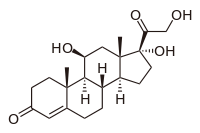
Photo from wikipedia
Community-based cohort studies have shown that low levels of N-terminal pro-B-type natriuretic peptide (NT-proBNP) increase the risk of cardiovascular events and death. However, these studies did not fully characterize the… Click to show full abstract
Community-based cohort studies have shown that low levels of N-terminal pro-B-type natriuretic peptide (NT-proBNP) increase the risk of cardiovascular events and death. However, these studies did not fully characterize the detailed clinical features, such as cardiac function and heart failure (HF) status, of the participants who were vulnerable to adverse prognosis due to their lower NT-proBNP levels. Because NT-proBNP levels are substantially affected by cardiac and non-cardiac factors, there was a need to evaluate the prognostic value of NT-proBNP levels in specific disease populations. In a recent issue of the mother journal, Verbrugge et al. revealed the cardiac/haemodynamic characteristics of patients with HF with preserved ejection fraction (HFpEF) and normal NT-proBNP levels, compared to patients with non-cardiogenic dyspnoea or HFpEF with elevated NT-proBNP. Intriguingly, NT-proBNP level alone did not necessarily distinguish between patients with and without HFpEF, especially in the lower range of NT-proBNP concentration, suggesting needs for alternative biomarkers more reflecting that clinical condition. The investigators also found that patients with HFpEF and normal NT-proBNP levels also exhibited a higher risk of mortality and hospitalization for HF than that in the control subjects (patients with non-cardiogenic dyspnoea). The study clearly raised an importance to identify the clinically meaningful characteristics of patients with HFpEF and lower NT-proBNP and emphasized an urgent need to determine the optimal clinical management of these patients. Recently, clinical trials of newer HF drugs, such as sacubitril valsartan and sodium-glucose cotransporter 2 inhibitors, have pried open the tightly closed doors to effective treatments for the HFpEF population. These trials often used the inclusion criterion of elevated natriuretic peptide (NP) levels to identify true HF patients and ensure the risk of HR-related events, and LETTER TO THE EDITOR
Journal Title: ESC Heart Failure
Year Published: 2022
Link to full text (if available)
Share on Social Media: Sign Up to like & get
recommendations!